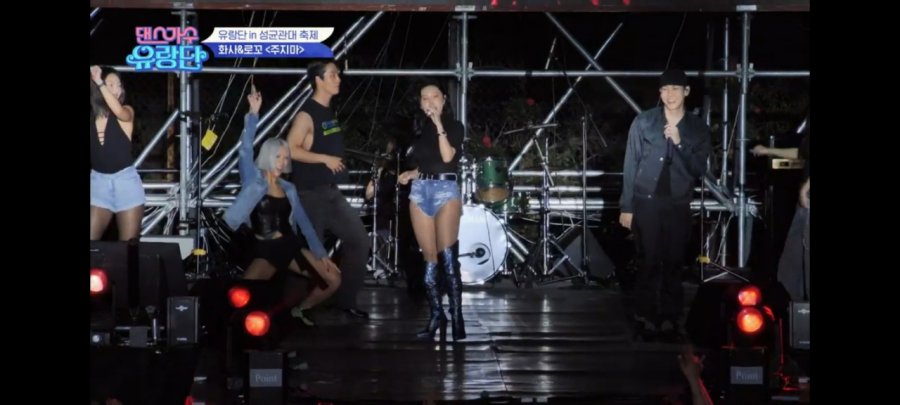July 14, 2023
SEOUL – Girl group Mamamoo’s Hwasa, 27, is under police investigation after a civic group filed an official complaint over the artist’s sexually explicit dance moves at a campus festival in May.
Hwasa, a popular K-pop star, was performing at Sungkyunkwan University as part of cable channel tvN’s music show, “Dancing Queens on the Road.” The show follows South Korea’s iconic solo dance artists Kim Wan-sun, Uhm Jung-hwa, Lee Hyo-ri, BoA and Hwasa as they travel around the country and perform at various locations.
The controversy over Hwasa’s performance erupted mid-May when a video of the Mamamoo singer performing her hit track “Don’t” was posted on YouTube prior to the release of the TV show.
Hwasa was seen making a sexually explicit gesture during the performance.
In the video, the crowd can be heard going wild, but some netizens later expressed concern over the singer’s dance moves, arguing that the performance was inappropriate and disturbing.
The scene was omitted from the “Dancing Queens on the Road” episode which aired on June 22.
Following Hwasa’s performance, the Protection of Human Rights of Students and Parents, a Korean civic group also known as Hakinyeon, filed a complaint against the artist for public indecency, reigniting the debate over artists’ freedom of expression.

A screenshot shows Hwasa’s performance in “Dancing Queens on the Road.” (tvN)
Seoul Seongdong Police Station on Monday said an investigation into the case against Hwasa started in early July.
Crossing the line
Shin Min-hyang, the representative of Hakinyeon, said that the organization filed the police complaint after much consideration.
“I know about freedom of expression. I am aware that the concert was a campus festival, where most of the spectators were adults (university students),” Shin told The Korea Herald at Hakinyeon’s office in Seocho-gu, southern Seoul, on Thursday.
“But it was not Hwasa’s solo concert in front of fans who are more or less familiar with her style of performance. Many visitors and nearby residents of all ages also enjoyed the campus festival, many with their children. There were also adults who felt uncomfortable with the performance. I thought it had little to do with ‘freedom of expression,’” Shin added.
Explaining that Hakinyeon filed the complaint against Hwasa on June 22, more than a month after the festival, Shin said the organization spent a lot of time reviewing the incident through legal consultation with local law firm Paracletus.
Shin said she felt a concrete decision needed to be made on performances by K-pop artists.
“Young children become trainees and pursue dreams of becoming K-pop stars. Many of them idolize singers, and Hwasa might be one of those (they admire),” Shin said.
“Children have easy access to various kinds of content. And there are artists who tend to make headlines with their racy actions. If those cases are simply regarded as ‘eye-catching’ events, I am worried that young teenagers will mindlessly try to emulate those behaviors,” she explained.
“K-pop stars enjoy global popularity nowadays. I hope such controversial performances do not create misleading stereotypes about Korean culture.”
Will Hwasa be punished?
Though Hwasa’s performance falls within the legal definition of public indecency, the possibility of the artist being charged with public indecency remains low, according to legal experts who spoke with The Korea Herald.
“The law states that racy actions are those which incite sexual desire, cause sexual arousal or inflict sexual harassment. The artist’s performance falls into this category. But, the public indecency law claims that the action needs to violate moral ethics concerning sexuality,” Shin Min-young, an attorney at Hoam, told The Korea Herald at the law firm’s office in Yeongdeungpo-gu, western Seoul, on Thursday.
Shin said that even if the inappropriate gestures were considered to be in breach of morals concerning sexuality, Korean law states that such actions conducted “in pursuance of accepted business practices, which does not violate the social rules shall not be punishable.”
“Though one can view Hwasa’s performance as inappropriate, it can also be recognized as a justifiable act, according to the law,” the attorney added.
South Korea’s Constitution guarantees freedom of expression, a law which takes precedence over public indecency laws. If the law starts to limit freedom of expression, it will eventually restrict even acceptable forms of expression, according to Shin.
Ent Law’s attorney Kang Jin-seok said that artists’ performances are made to serve an artistic purpose. Hwasa’s dance moves can be seen as a performance that matches the music, instead of a disturbing act intended to induce sexual desire, according to Kang.
“It is unlikely that the law will restrict such actions in the future,” Kang explained.

Ent Law attorney Kang Jin-seok (Courtesy of Kang)
“Unlike the 1980s and the 1990s, when censorship was commonplace for films and TV programs, freedom of expression is now respected. Standards and regulations of indecency are being relaxed as well. It is unlikely that legal measures will be established to guide artists’ actions,” the attorney added.
However, Kang noted that if a grave situation that strongly violates public indecency laws were to occur, a standard for public indecency might be discussed by the judiciary.


